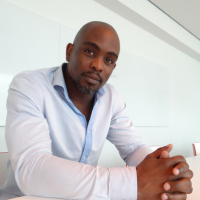TEDxDelft 2016 | Kevin de Randamie | Calling for a creative revolution
 “The creative industry is the only industry that does not require resources to create value,” said Kevin de Randamie, also known as Blaxtar, general manager at Braenworks. And yet the perceived economic value of the top 20 {95388bbb2e9df0f2b3d26445fc24fe82185b1b567dbb094bc3a45074083d0a2b} of performing artists seems exaggerated. While that of the remaining 80 {95388bbb2e9df0f2b3d26445fc24fe82185b1b567dbb094bc3a45074083d0a2b} is largely discounted, discredited or ignored.
“The creative industry is the only industry that does not require resources to create value,” said Kevin de Randamie, also known as Blaxtar, general manager at Braenworks. And yet the perceived economic value of the top 20 {95388bbb2e9df0f2b3d26445fc24fe82185b1b567dbb094bc3a45074083d0a2b} of performing artists seems exaggerated. While that of the remaining 80 {95388bbb2e9df0f2b3d26445fc24fe82185b1b567dbb094bc3a45074083d0a2b} is largely discounted, discredited or ignored.
De Randamie’s big passion has always been music, and he started to make music early on. He went on to work at various accounting jobs at different companies, but his passion for music remained. Using the money he made from his accounting jobs, he founded a company aimed at promoting artists who had a positive but critical message on societal issues. At the same time he started a non-profit organisation which brings together people and poets, in order to promote word craft disciplines. Since 2014 he also works as general manager at Braenworks.
During his time working in the creative industry, De Randamie has seen and experienced many things which have shaped his vision on the creative industry as a whole. “I was doing well, releasing my own music as well as that of others,” he recounted. Until 2010, when the government announced cutbacks to culture. “I took a big dive, I was registered as a sole trader and thus privately responsible and accountable.” It even went as far as having to sell equipment just to make ends meet. “Revenue was low and profits were marginal despite having decent success.” Times had become very tough for De Randamie. But what intrigued him most of all was how companies who made even no profit could be sold for tremendous amounts of money. If they could, then what was so different about the creative industry?
De Randamie went on a search to find out why. “The creative industry works the same way similarly all across the globe,” he said. “Fashion, movies, music, they are all exploited the same way.” Yet his search was not as easy as that, since there are no models to determine value for creative companies. But a realisation came in the end. “I realised that the most valuable item, creativity, could not be sold.” Armed with these new insights De Randamie set up new initiatives, which would later turn into companies. But the main realisation is what still irks De Randamie the most. Namely that the top 20 {95388bbb2e9df0f2b3d26445fc24fe82185b1b567dbb094bc3a45074083d0a2b} of the creative industry remains visible, while the rest remain in the shadows. De Randamie is convinced, however, that his knowledge learned from difficult times has led to a solution that could help those part of the 80{95388bbb2e9df0f2b3d26445fc24fe82185b1b567dbb094bc3a45074083d0a2b}.
Want to hear how De Randamie wants to empower 80 {95388bbb2e9df0f2b3d26445fc24fe82185b1b567dbb094bc3a45074083d0a2b} of the creative industry? Then buy your tickets now, join us on Friday 15 April and celebrate the universal genius.

[…] Pensando nisso, a Heineken convidou Kevin ‘Blaxtar’ de Randamie, rapper holandês e palestrante de TEDx, para destacar algumas das informações mais relevantes do seu relatório de sustentabilidade de […]